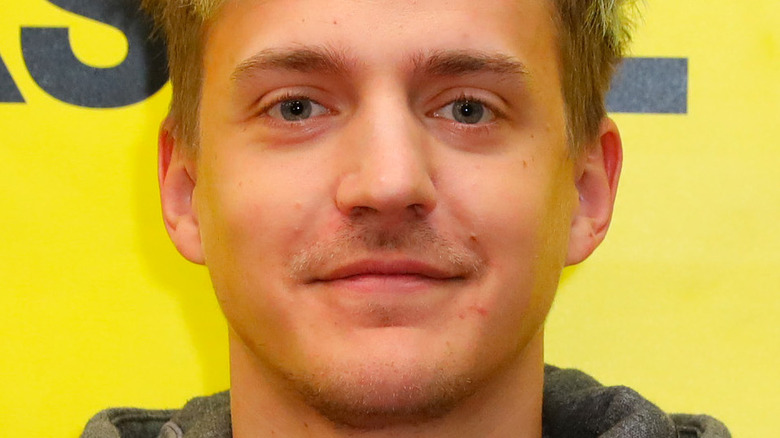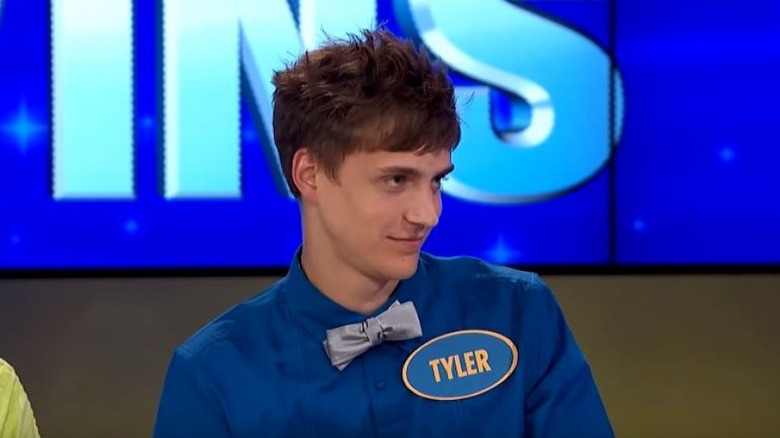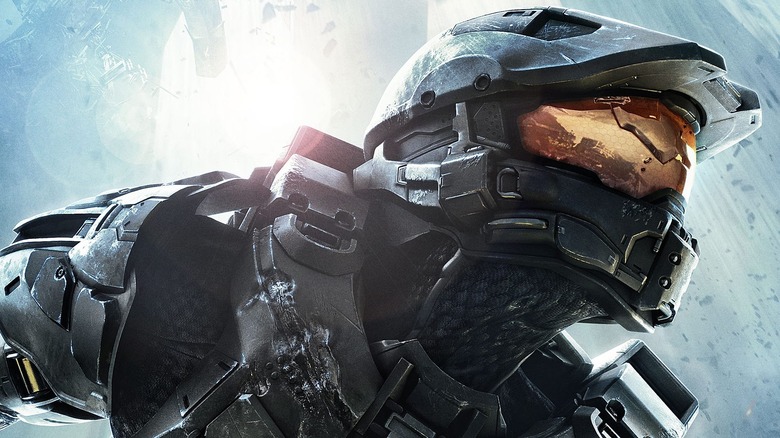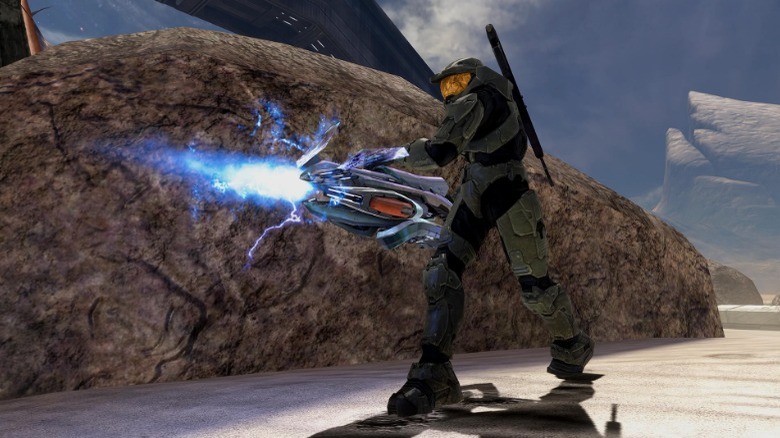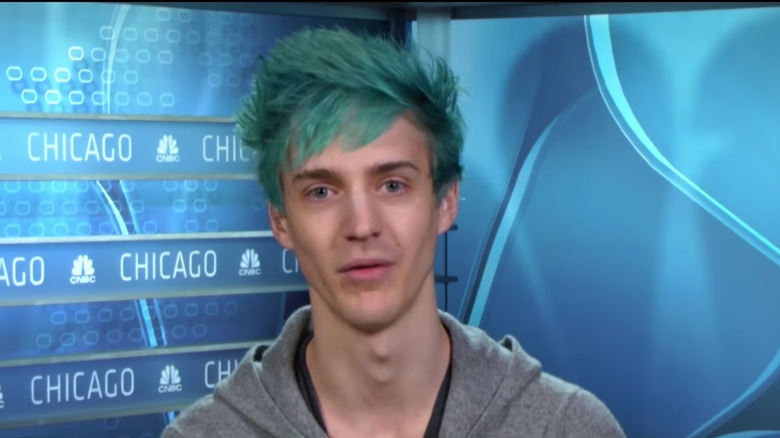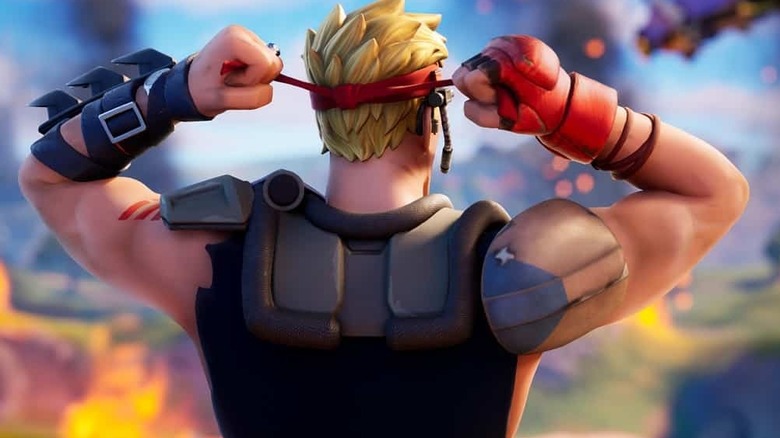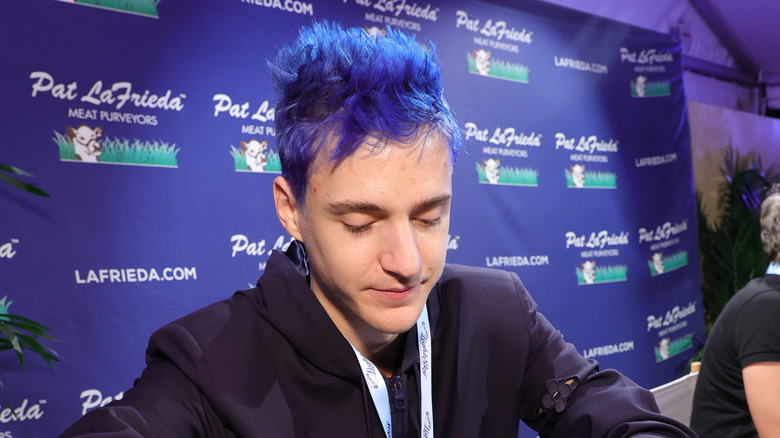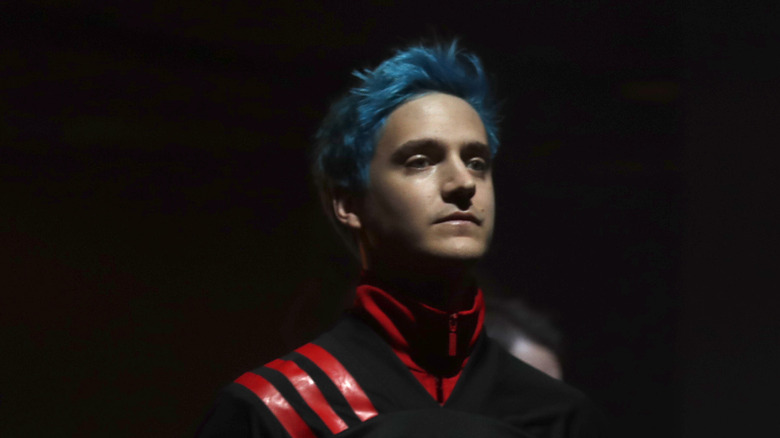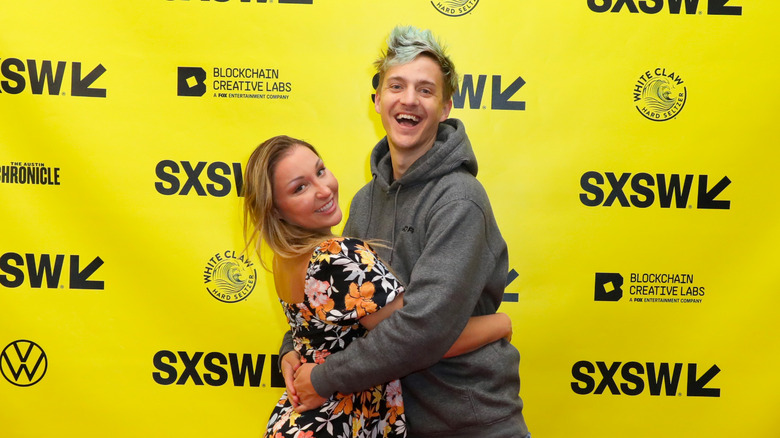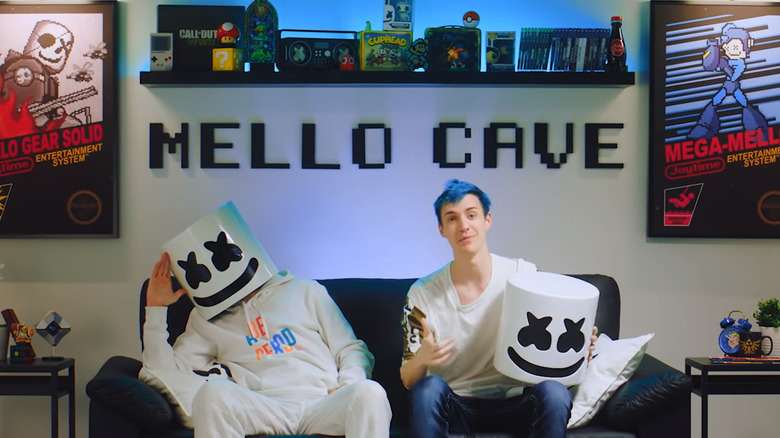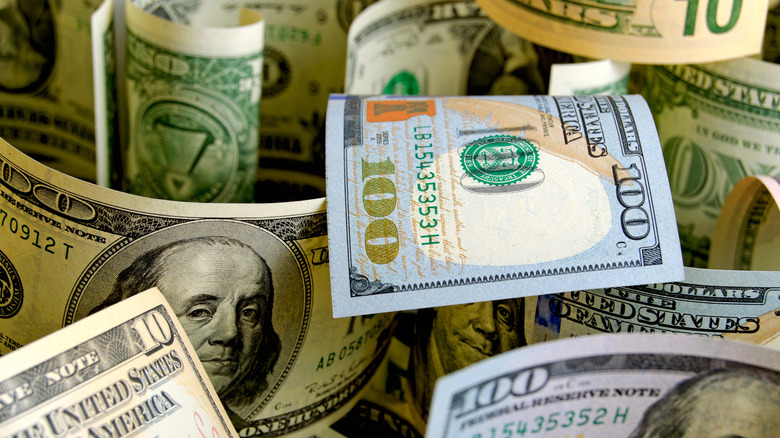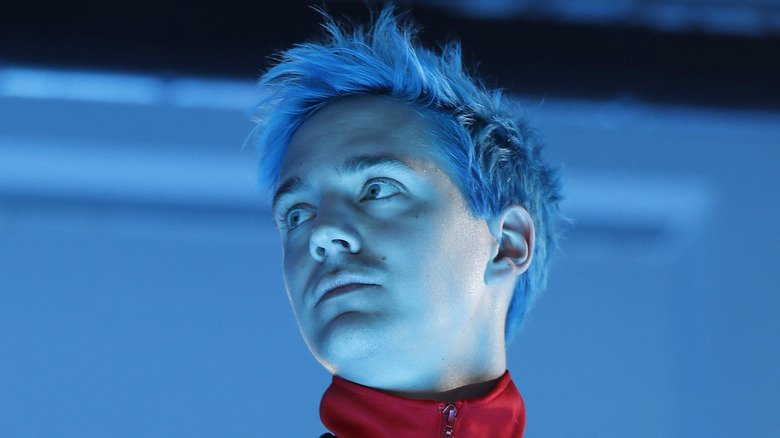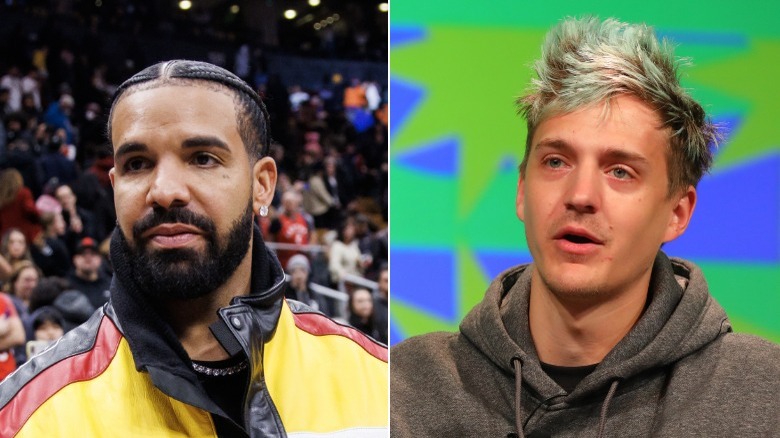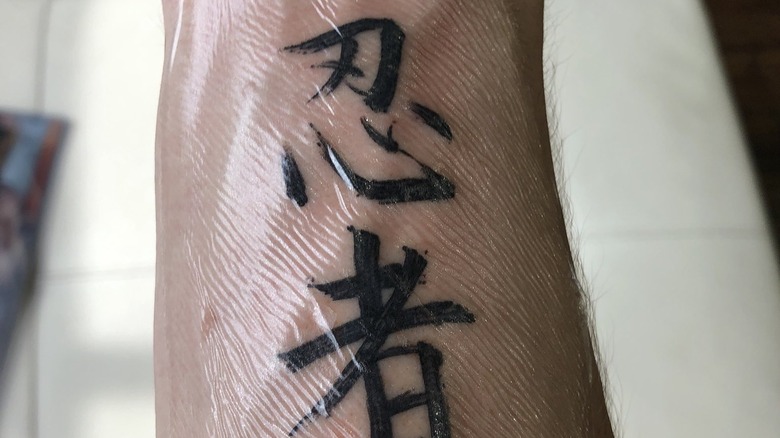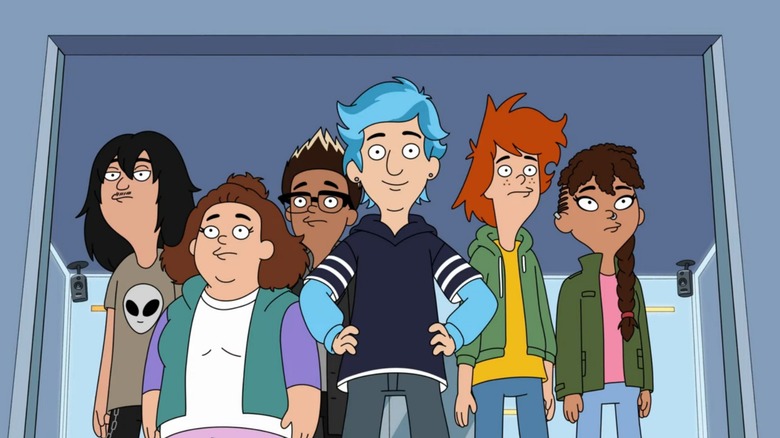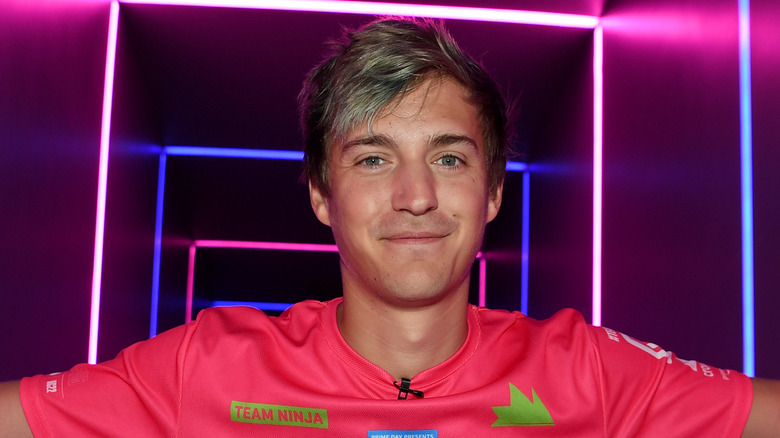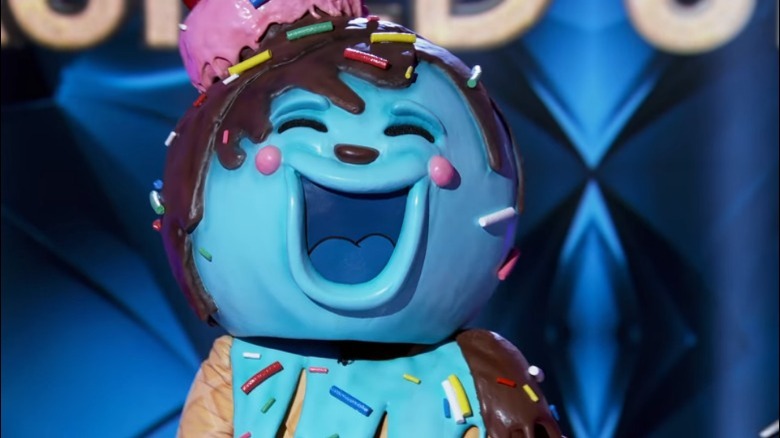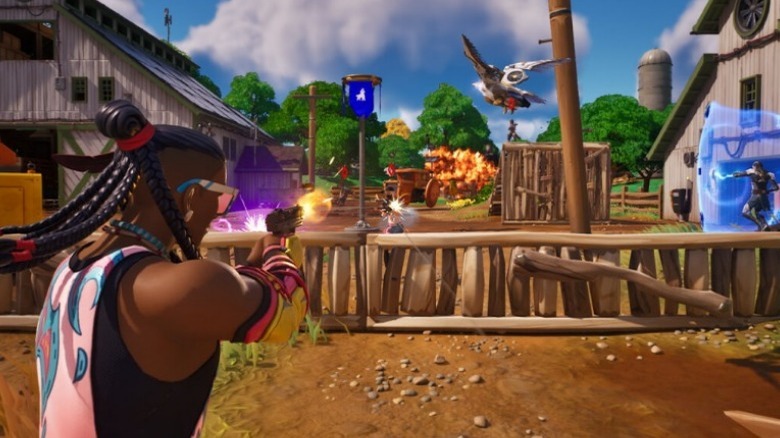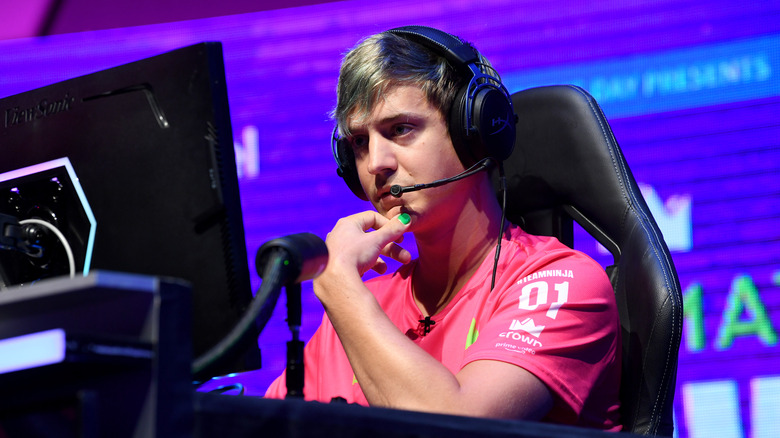There's Much More To Ninja Than Streaming On Twitch
Twitch personalities are a lot like YouTube personalities (and some, in fact, pull double-duty on both platforms). They build up followings of devoted fans and earn income based on the number of viewers — and in Twitch's case, paying subscribers — they're able to draw. Some stream games as a hobby, a way to play a title with a virtual couch full of friends watching. But a select few have managed to turn their streaming efforts into a full-time job.
One of those streamers is Tyler Blevins, best known in the gaming world as "Ninja." Back in 2018, he reportedly brought in over $500,000 a month thanks to his broadcasts on Twitch, as well as through his YouTube channel and the endorsement deals he'd inked. You might have heard about Ninja on the news, or from a friend who watches his streams. He has become increasingly popular among gamers, and though you can find a healthy amount of information about Ninja online, some of the more fun facts about this streaming star are well hidden. Fortunately for you, we've uncovered them.
He once held down a typical job
Most celebrities aren't born into fame. Instead, they start their lives as most people do. They go to school, play sports, and labor at part-time jobs. Before he found success as a streamer, Ninja was no different. He worked at Noodles & Company, a restaurant chain with a focus on noodle dishes and sides (via CNBC). And he did this while also attending college and playing soccer. In Ninja's mind, keeping everything straight in the other areas of his life would allow him to focus on games down the line.
"It was one of those things where if I was doing well in school, putting in the time and effort there, and soccer as well, that I would be rewarded to play as many games as I want," he told CNBC. If you're thinking of following in Ninja's footsteps, his advice is to keep living your life, too. "All the kids out there, you can't just drop everything and focus on playing video games for a living."
He appeared on Family Feud
Tyler "Ninja" Blevins is pretty good at video games, but what about game shows? Believe it or not, there's actually an answer to that question from back in 2015. The Blevins family — consisting of Tyler and several of his family members — took part in multiple episodes of "Family Feud." They wound up having a successful run on the show, racking up a total of $40,000 in winnings over the course of four episodes.
A "Fast Money" answer by Tyler — "paper," to the question, "Name something that begins with the letter 'p' that you might find in an office" — helped the family win $20,000 of their overall total. Before that, they managed to secure an invite to the show thanks to Tyler's creativity. There were no audition events scheduled near the Blevins' home, so Tyler had the family film a homemade audition tape (per Polygon). The tape captured the attention of the show's producers, who invited the family to the Family Feud studio for an in-person audition.
He got his start in games as a professional Halo player
Ninja didn't jump straight into streaming once he decided on video games as a career. In fact, he can credit a fair amount of the fanbase he started with as a streamer to the job he had prior: professional "Halo" player (via CNBC).
Way back in 2009, Ninja began attending "Halo" events competitively, kicking off with a "Halo 3" tournament in Orlando, Florida. From there, he picked up "Halo: Reach" and competed in that title. But it wasn't until the "Halo 4" 2012 MLG Fall Championships that Ninja really made a name for himself. His team finished the competition by taking home the grand prize, with Ninja securing the last match's highest score.
Ninja continued playing "Halo" professionally, competing with renowned teams like Renegades and Team Liquid. Eventually, his streaming ambitions took center stage, and he left the world of professional gaming to concentrate on growing his Twitch audience full-time.
His father attended his first tournament
Who doesn't love seeing parents support their children by taking an interest in their hobbies? If only that was the sole reason Ninja's father went to his first tournament. As established earlier, Ninja got his start playing "Halo." In 2009, he began attending "Halo" tournaments competitively and quickly climbed the leaderboards. During an interview with Trever Noah on "The Daily Show," Ninja revealed that his father witnessed the dawn of his meteoric rise from the bleachers — but he didn't attend just to cheer on his son.
According to Ninja, his mother asked his father to accompany him to his first "Halo" tournament because she was convinced it was a front for a pedophile ring. No, seriously. Ninja's mother believed Major League Gaming (MLG) was, as Ninja put it, "a fake company of old people who lured kids to molest them." Thankfully, no such violations occurred. Not only did Ninja receive payment for his time, but his father got to see his son's future blossom live on stage. You can't ask for a better conclusion.
He experienced massive Twitch growth from late 2017 through early 2018
At one point, Ninja's Twitch streams pulled in respectable numbers, but they weren't anywhere near the top of the charts. For instance, a former moderator of Ninja's channel claimed that the streamer would garner "about 800 viewers max" per broadcast in 2014, and that he had less than a thousand paying subscribers (via Kotaku). But the situation changed. The more popular Ninja became, the more people tuned in to watch. And the faster he grew as a result.
By 2018, Ninja had made leaps and bounds in his Twitch subscriber count, hitting approximately 160,000 in March 2018. The growth was pretty mind boggling on its own, but when you attach a price to each one of those subscribers — $5 a piece before Twitch's cut — you come to the realization that Ninja made over $560,000 a month at the time from streaming alone (per CNBC).
Some viewers attributed Ninja's massive growth to bots
When someone achieves an unheard-of amount of success, skeptics always appear to take a good, hard look at how it happened. Ninja's monster growth on Twitch over the course of several months invited plenty of inquisitive eyeballs. Some Twitch viewers believed that Ninja's meteoric rise on the platform had less to do with popularity and more to do with a promotion Twitch ran at the time (per Polygon).
As detailed by Polygon, reports circulated in early 2018 that an issue tied to fake Twitch Prime accounts had emerged after Twitch started giving away free channel subscriptions as part of its ties to Amazon. Every Amazon Prime account is also a Twitch Prime account, and those who pay for Amazon's premium tier get one free subscription to use per month. When Twitch handed out free "Fortnite" gear to Twitch Prime members, third-party sellers reportedly sold accounts off to try and capitalize. And buyers of these second-hand accounts not only ended up getting the "Fortnite" swag they wanted, but also a free subscription to burn.
When you add in the fact that "Fortnite" was one of the games Ninja played most often during this time period, you can see why folks might have made the connection. For what it's worth, Twitch eventually told Polygon in a statement that it didn't believe its accounts had been compromised by bots, instead identifying the subscriber increases as genuine.
He once received a 48-hour Twitch ban for doxxing a viewer
Streamers have to adhere to a number of rules and regulations when broadcasting on the Twitch platform. One such rule has to do with "doxxing," the act of outing someone's identity and/or private information online. According to Twitch, "Sharing someone else's sensitive data without their permission can be both a distressing and potentially dangerous experience. Therefore, Twitch doesn't allow users to reveal personal information of others on our service."
Ninja came under fire for violating this rule back in 2016 after receiving a donation containing a racist message, which appeared on his stream. As retribution for the slur within the donation, Ninja released bits of personal information about the viewer who donated throughout the night — a clear violation of the Twitch rule mentioned above. After many Twitch users reported his behavior, Ninja did receive a suspension. However, it only lasted for a 48-hour span, which led some to speculate that he received a slap on the wrist due to the audience he draws on the platform.
He was the subject of an unusual death hoax
On July 16, 2018, an Instagram user named ninja_hater posted a photo of Ninja standing with several other dead celebrities, as though to insinuate that the Twitch star had passed away. And with that photo came a request to the account's followers: "Spread this. Let's make fake news" (via The Daily Dot). The story only gets weirder from there.
Those who saw the photo took up ninja_hater's mission, spreading word of Ninja's purported death around the Internet. And somewhere along the way, a meme involving a completely fictional disease called "ligma" became intertwined in the prank. As the day wore on and Ninja had yet to stream, the claims making the rounds became more and more believable.
Finally, several hours later, Ninja tweeted to his fans. He'd been traveling, and the tweet made clear what those who'd started the joke knew all along: Ninja was not actually dead (per Polygon). Ninja, to his credit, was a good sport about the hoax. Unfortunately, the situation didn't end there. It went on for several more weeks.
He avoided streaming with female gamers at one point in time
Earlier in his career, aside from a rare case here and there, Ninja had mostly managed to keep himself out of the news because of controversy. But he came under fire in 2018 due to a decision he made regarding his Twitch streams. And the criticism came not from the content of his streams, but due to the people he excluded from them. At the time, Ninja chose to avoid streaming with female gamers. Why? He wanted to remove the chance of complicating his relationship with his wife, Jessica.
Ninja explained his stance in more detail to Polygon: "If I have one conversation with one female streamer where we're playing with one another, and even if there's a hint of flirting, that is going to be taken and going to be put on every single video and be clickbait forever." The view drew a divided response, with some pointing to the propensity for the internet to spread false stories about Ninja — like the death hoax — as proof of the legitimacy of his concerns. Others accused him of pushing an "exclusionary" policy or discriminating against women in general (via Polygon).
Ninja has since changed his stance, streaming with female content creators such as Valkyrae, as documented by Kotaku.
Ninja's wife used to be his manager
It's not uncommon for colleagues to fall in love and get married after working together. Ninja's path to becoming colleagues with his wife occurred in reverse order.
Ninja's wife, Jessica Blevins (formerly Jessica Goch), met Ninja by an odd twist of fate that she detailed in an interview with Insider. A previous boyfriend invited her to a "Halo" tournament, but they broke up the week before it took place, so she considered skipping.
She attended anyway and met Ninja, who had a different partner of his own back then, so the two didn't communicate much. But three years and one bet later, Ninja and Jessica reconnected on Twitter and started dating, which eventually led to marriage. But how did that result in Jessica becoming Ninja's manager?
According to Jessica, she observed Ninja rushing responses to possibly lucrative emails so he could get back to streaming as quickly as possible. She realized that if Ninja wanted to put his best foot forward with companies that wanted to collaborate with or sponsor him, she would have to write all the replies. Jessica even wrote emails that pitched Ninja to companies like Alienware and HyperX. It wasn't easy, but she felt Ninja was worth it, although in October of 2022, she stepped down from her managerial position. Jessica remains married to Ninja and involved in his business, she's just no longer his legal representative.
He has an ongoing feud with Pokimane
Earlier in 2022, a "hate raid" hit Pokimane during a "Valorant" stream. A hate raid occurs when typically anonymous users spam insults and harassing comments in stream chats en masse. In this case, the inciter was Jidion "JiDion" Adams, who sent his followers to target Pokimane's channel. Twitch handed him a 14-day ban, later upgrading it to a permaban.
When Pokimane discussed the event with her followers, she claimed Ninja and his fans supported JiDion. According to her, JiDion talked with Ninja, "[gifted] him subs," and sent followers over to Ninja's channel to ask him to help JiDion prevent a ban. Pokimane also asserted that in return, Ninja said he would aid JiDion ... and called Pokimane a derogatory term (or at least said the word in a context that referred to her).
Ninja and his wife pushed back against Pokimane's claims. Jessica Blevins messaged Pokimane and threatened to take her to court for "defamation." But so far nothing has come of these threats. In her latest update about the feud, Pokimane said she wants nothing to do with Ninja. Only time will tell if the Blevins actually sue Pokimane.
He took two days off Twitch ... and lost 40,000 subscribers
How much does consistency matter to Twitch streamers? It's one of the first tenets any pro will espouse. If you want to grow, you need to stream on a regular basis. Some live by the code. And some — like "Destiny" streamer Professor Broman — have criticized it (via Polygon). But there's no doubt that time off can hurt your Twitch channel, just as it did to Ninja. He took two days off during E3 2018 to take part in the "Fortnite" Pro-Am, a decision that he claimed cost him 40,000 subscribers.
For someone like Ninja, who at one point had 250,000 subscribers, that's a hit he can probably take. But for smaller streamers, losing 16% of their audience could be far more catastrophic. Ninja shared the stat on Twitter, and didn't take the dip in numbers too hard. Rather, he wanted to share the tough reality of streaming as a full-time career. "Wanna know the struggles of streaming over other jobs?" he asked. "I left for less than 48 hours and lost 40,000 subscribers on Twitch. I'll be back today (Wednesday) grinding again."
A fan once donated a total of $62,000 to him in one night
Twitch streamers make their money in a number of different ways. One revenue channel comes courtesy of ads, which run during broadcasts. Streamers get a cut of Twitch's ad revenue when they become partnered with the platform, meaning they're recognized as featured content providers. These partnered streamers also obtain the ability to have subscribers who can pay $5 per month to support the streamer and turn off ads.
But there's a third option that can be quite lucrative for streamers: donations. Many streamers love donations, as they're paid fully to the streamer without Twitch taking a percentage. Most viewers only donate a few dollars here and there, but some have been known to go overboard. And in one night, one single viewer gifted Ninja with $62,000 in donations, which caused Ninja to — quite understandably — lose his mind during his broadcast. Ninja frequently screamed, "That is not possible!" And after several of the donations come in, he had to get up and walk away from his computer to collect himself.
This does beg the question, though: Who has $62,000 to donate to a Twitch streamer? And why so much? He'd soon find out.
His community later got scammed by the above donor's GoFundMe
The Twitch fan who donated $62,000 to Ninja used the nickname AC Royale, and as it turns out, had a history of making large donations to many of his favorite streamers. Which is why it was heartbreaking when a GoFundMe page popped up online requesting donations for medical bills, stating that AC Royale had been struck in a hit-and-run and needed to have a brain operation. Ninja's community answered the call, funneling thousands of dollars to his medical care. But the more the viewership started to dig into his story, the more fishy it became.
Eventually the fanbase presented evidence that the story behind the GoFundMe was untrue, and after pulling his Twitter account offline, AC Royale came back to explain himself. He stated that he'd once had a great job with a nice income, but he'd lost it, and found himself in dire financial straits. Despite not having paying work, though, AC Royale continued to donate to Twitch streamers as a way to "feel good." He created the GoFundMe because he needed money, but vowed to return all of the donations he'd received through the campaign. Ninja later wrote a letter to his community to relay the disappointment and hurt he felt over the incident.
Ninja played Fortnite with rapper Drake
Ninja is considered a Twitch celebrity in his own right, whereas Drake is pretty embedded into the world's pop culture scene. The Canadian rapper has hosted "Saturday Night Live," for crying out loud. So, you can imagine that any Twitch streamer who has Drake on as a host is going to get a lot of attention. Drake joined Ninja for a few rounds of "Fortnite" in the middle of March 2018, and the duo, as Complex put it, "broke the Internet."
Over 600,000 people tuned in to watch them play together, and at one point, rapper Travis Scott and NFL wide receiver JuJu Smith-Schuster also joined the stream. The result was a melding of three different worlds – gaming, music, and sports — by several professionals who were highly regarded in each of their respective spaces. Ninja's viewer count on that day even broke a Twitch single-day record previously held by Dr Disrespect.
He got a tattoo after his community hit a charity stream fundraising goal
Prior to GuardianCon in 2018, Ninja had no tattoos. So, when it came time to make a deal with his community for a charity goal, he had plenty of canvas available for such art — and plenty of fans ready to make a tattoo happen (via Dot Esports). Thus, he decreed that when the donation total hit $200,000, he'd get some ink. And if his community managed to hit a total of $250,000 in donations, he'd get another tattoo. They crushed it.
All in all, Ninja's community managed to bring in $320,000 to benefit St. Jude Children's Hospital, including a $100,000 drop from an anonymous donor. Which meant Ninja had to get inked. And he did. The first tattoo he chose was the name "Ninja" in Japanese. For the second, he promised to get a "Fortnite" llama tattoo — a nod to the title that's made him such a huge draw both on Twitch and at other game-related events.
He has some stealthy voice credits
Streamers and YouTubers are steadily turning into the backbone of entertainment. Not only do content creators like Tyler "Ninja" Blevins make as much bank as Hollywood celebrities, but some have even received acting roles. Mark "Markiplier" Fischbach may serve as the most obvious example since he starred in the "Five Nights at Freddy's: Special Delivery" commercial and voiced characters in the cartoon "Villainous," but Ninja doesn't stand far behind.
Ninja first appeared in non-streaming formats in 2016, starting with the music video "Pleasure Dome: February 26th, 1981." Since signing with the Creative Arts Agency in 2020 (via The Hollywood Reporter), he has cameoed in more projects. Many audience members probably recognized Ninja when he guest starred in "Free Guy," but other streamers like Jacksepticeye and Pokimane did as well. Admittedly, most of Ninja's roles can be summed up as "Ninja playing himself," but he has experience portraying other characters too.
In 2022, Ninja kicked off his voice acting career outside of videos games with two parts. He played a minor "Hotel Transylvania 4" character dubbed "Party Monster" who fittingly only appears during the movie's dance party scene. Ninja's second role was slightly larger, albeit as a pastiche of himself: the streamer Slayer from the third season of "Duncanville." You can probably look forward to more Ninja acting roles in the future.
He is almost blind in one eye
It's no secret that excessive gaming can lead to serious injuries. Most involve your limbs or spine, but some can actually impact your eyes. The old wives tale that you can go blind by sitting too close to a screen might be mostly false, but there's always an exception. Just ask Ninja. In 2020, Ninja revealed via Instagram that he has lost most of his sight in his right eye.
Long before creating the post, Ninja experienced severe eye pain while playing "Destiny." When he visited an eye doctor, Ninja learned that his retina had detached. To fix the problem, he went through several surgeries, including some for cataracts. In the end, he regained partial sight in his eye, but not all of it. His care team claimed that the situation could have turned out much worse, with him going "completely blind in [his right] eye."
Despite the harrowing experience, Ninja expressed gratitude that one of his eyes still works well and that he has been able to continue working.
He was the Ice Cream on The Masked Singer
"The Masked Singer" has crammed big names from various industries onto the stage to sing their hearts out. Viewers have seen actors like Drew Carey and Danny Trejo, icons such as Tony Hawk and Kermit the Frog (no, seriously), and even Sarah Palin perform live. Ninja is one of the few internet personalities who has appeared on the show.
During the second season of "The Masked Singer," audiences witnessed an anthropomorphic ice cream cone sing Lil Nas X' "Old Town Road" and Devo's "Whip It." He didn't last long, but hey, at least he gave audiences a show to remember. When the Ice Cream unmasked itself, viewers were shocked to find Ninja under the giant helmet. They were also probably shocked to learn Ninja could actually sing, too.
The day after Ninja's elimination, Entertainment Weekly published an interview detailing his recruitment and training for the show. According to Ninja, the showrunners contacted him through an email laden with code names, after which they laid out their plans in a phone call. To help him get ready, the showrunners hired "multiple voice coaches" not only to ensure Ninja could carry a tune but to gauge his "vocal strengths" and suggest songs that play to them. He had some karaoke experience, but thanks to his time on "The Masked Singer," Ninja is a better vocalist than ever before.
Ninja's feud with IcyFive
Cheating is no laughing matter in the modern gaming landscape. Codes that give character models Donkey Kong arms and balloon heads have been replaced by programs that let players see through walls and effortlessly hit enemy heads. You don't even need a cheat engine to gain an unfair advantage; just watch an opponent's Twitch stream to figure out where they are. Of course, when accusing people of these misdeeds, it helps to make sure they actually cheated.
During a 2018 "Fortnite" stream, a player by the name of IcyFive eliminated Ninja. The content creator didn't take the loss kindly, and when he saw IcyFive emote, he interpreted it as a sign that IcyFive had stream sniped him (i.e., watched his stream to determine his location). In response, Ninja reported IcyFive for cheating.
Stream sniping has long been one of Ninja's pet peeves. Stream snipers have targeted him multiple times in the past, but it turned out that IcyFive wasn't one of them; he even provided evidence of his innocence. Ninja's long-time streaming partner, Benjamin "DrLupo" Lupo, even came to IcyFive's defense. Ninja eventually apologized for his claim, though he subsequently accused IcyFive of "milking" the event.
He has a fluctuating relationship with Twitch
All the biggest streamers have their preferred streaming platforms. Some favor Twitch, while others rely on YouTube. But every time Ninja settles on a home, he seems to change his mind quickly. In September 2022, Ninja announced his decision to take a break from streaming. This news came right after yet another encounter with a player who used a Rift-to-Go in "Fortnite." Ninja responded by rage-quitting and calling off what should have been a long stream. A week later, Ninja returned rested and ready to stream yet again, only this time he didn't plan on limiting himself to Twitch; he would stream "everywhere."
This little bit of drama was the latest in Ninja's love-hate relationship with Twitch. In 2019, he left Twitch because he felt the platform's then-latest contract was too restrictive in regards to sponsorships, licensing, and deals beyond the gaming sphere (via Business Insider). Moreover, Ninja and his wife, Jessica Blevins, thought Twitch had failed to listen to their concerns. So, Ninja traded Twitch for Mixer, but barely a year later, Ninja announced his plan to go back to Twitch (per Hollywood Reporter). Then again, Mixer didn't experience the success anyone expected or hoped for, so Ninja didn't have much of a choice.

